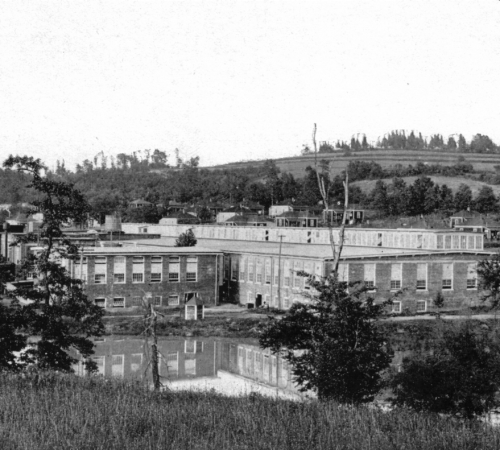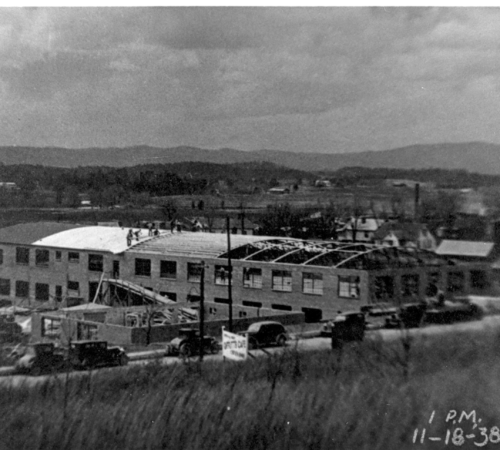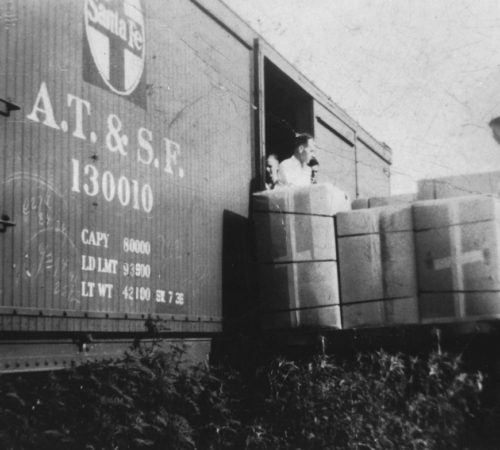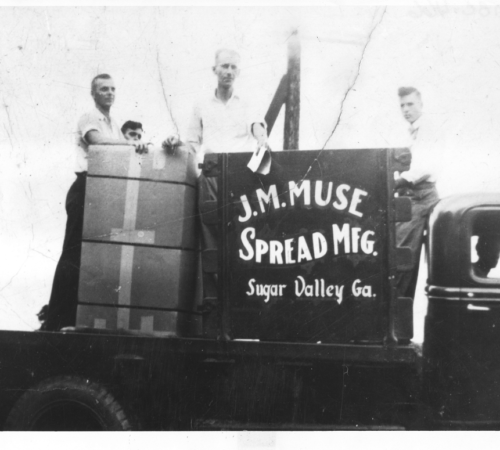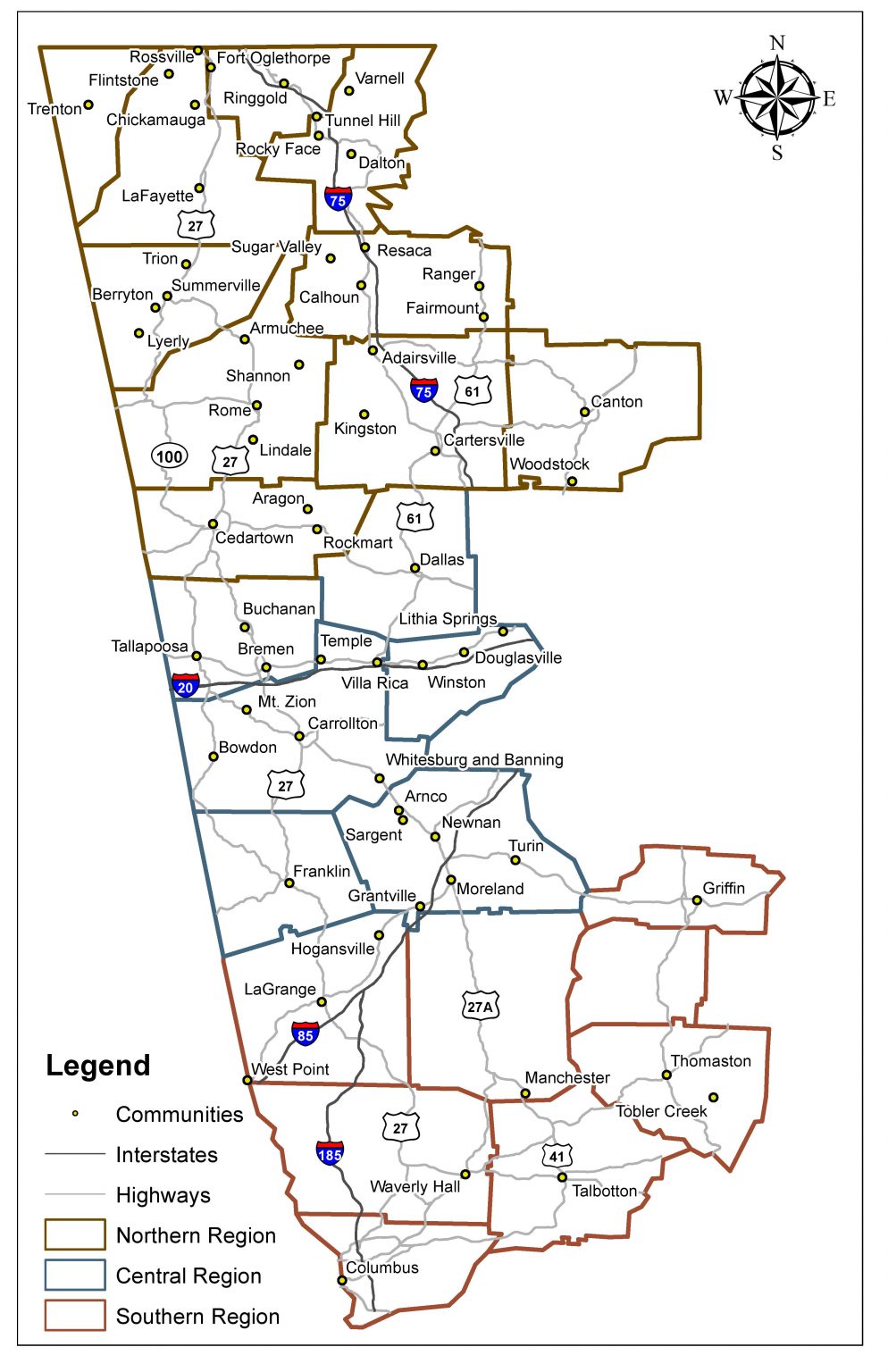Both national and international markets saw this community’s sheeting and corduroy, as well as its chenille bedspreads and carpet flooring.
Calhoun got a manufacturing head-start with the establishment of Echota Cotton Mill, which was the most modern of its kind at the time. It experienced massive success during its time operating, staying open for almost 80 years, and declining only due to international competition.
Visit
Things to Do
- Harris Arts Center, 212 South Wall Street: Home to the Roland Hayes Museum, Ratner Theater, art galleries and The Art Market Gift Shop. The Harris Arts Center features rotating exhibits, instruction and cultural performances. The art market offers a diverse variety of affordable handcrafted gifts by local and regional artists.
Places to See
The following properties are not open to the public, but you can view them from the exterior to learn more about the buildings that supported the textile industry here.
- Apache Mills Plants: Apache Mills, another Calhoun-headquartered flooring giant, has a handful of plants in operation in Calhoun.
- Dixie Belle Bedspread Co/Mohawk Industries Homebound Rug and Textile Division, 311 West Line Street: This building was originally the site of Dixie Spread Company, founded in 1937. Dixie Spread was purchased by Bell Textile, a New York-based company which originally sold sheeting to Dalton companies and was owned by Israel Belsky, in 1939. Bell Textile followed this up by founding Dalton’s Belcraft Chenilles in 1945. Belcraft Chenilles became the centerpiece of the Bell Textile group of companies, buying up other companies in Dalton and becoming known for their quality. Meanwhile, the Bell Textile group’s original Dixie Belle Mills featured more affordably priced goods, being advertised as the “best of the popular-priced chenilles”. By 1956 Bell Textiles, between its two mills, offered Hopalong Cassidy, Tom Corbett: Space Cadet and Davy Crockett themed chenille bedroom ensembles. Bell Textiles sold the Dixie Belle plant to Fulton Industries in 1963, it is now part of Mohawk Industries’ Homebound Rug and Textile Division.
- Mohawk Flooring Plants: Mohawk Flooring, one of the largest flooring producers in the world, is headquartered in Calhoun. They operate the GBH and UGD plants amongst others.
- Shaw Industries Plants: Shaw Industries, the largest carpet and flooring manufacturer in the world, has several plants in Calhoun. WF, Y4, Y5, D7, D4
- C.M. Jones & Company, 222 South King Street: This operation manufactured chenille bedspreads during the 1930s and 1940s. It is unclear if production continued into the 1950s. It is a distinct possibility that C.M. Jones was a scion of Calhoun’s Jones family, which was heavily involved in both the Echota Cotton Mills and Hy-way Arts Incorporated, yet another chenille business.
- Echota Cotton Mills Smokestack, 965 North Wall Street: Incorporated in 1907, Echota Cotton Mills was Calhoun’s first major textile business. The mill was originally a small operation, only employing 65 people. By 1945 it had quintupled in size, boasting 21,596 ring spindles and employing 325 people. It produced sheeting the whole time. The mill was sold to Mt. Vernon Mills in 1973, who eventually closed it in 1985. The mill’s smokestack still stands, towering over a modern Mohawk Industries outlet store.
- Mt. Alto Bedspread Company, 509 South Wall Street: Thought to be one of the first modern tufting factories in the area, J.H. Boston Sr.’s Mount Alto Bedspread Company began producing chenille bedspreads in 1935. Later renamed Velvetone and Forrest Mills, the operation was purchased by West Point Manufacturing Co. in 1962. In late 1987, Shaw Industries became the world’s largest carpet maker by purchasing the carpet business of West Point-Pepperell.
- Sequoyah Textile Company, 301 South Park Avenue: This operation, active in the 1940s, manufactured chenille bedspreads. It is likely that this business was a short-lived one, as it never subscribed to any of the textile sales directories that some of their contemporaries utilized. Due to the size of the building, it is likely that the majority of the tufting was outsourced to individual tufters who worked out of their homes and were paid per each bedspread completed rather than hourly or yearly.
History
In 1909, Echota Cotton Mill opened in Calhoun becoming the most modern manufacturing plant of its kind. The mill produced sheeting in 1910, adding coarse yarns by the early 1920s. Citizens from all over Gordon County came to work at the mill. Due to the need for labor, employment at the mill grew from 65 to 110 employees. Construction of a mill village including a company store began in the early 1920s with the addition of a schoolhouse in 1924. The mill employees organized Echota Baptist Church, built by mill owners, that same year. The mill continued to grow and expand during the 1930s. Converting raw cotton into top-quality sheeting and corduroy with machines powered by coal-fired steam boilers, Echota Mills catered to both national and international markets.
Purchased by Mount Vernon Mills Inc. in 1970, by 1979 the mill consumed 7 million pounds of raw cotton with a payroll of $3 million. Experiencing various expansions, changes, and improvements throughout its history, Echota Mills evolved from steam power to individual electrical drives. The mill began to decline facing increasing competition from cheaper foreign imports and closed in 1985. All that remains of Echota Cotton Mill is the red brick smokestack.
As chenille bedspreads became popular in the 1920s and 1930s, companies moved the production of spreads from homes and spread houses into small factories, such as Mount Alto Bedspread Company in Calhoun. Thought to be one of the first modern tufting factories in the area, the Mount Alto Bedspread Company, began producing chenille bedspreads in 1938. Later renamed Velvetone and Forrest Mills, West Point Manufacturing Co. purchased the mills in 1962. In late 1987, Shaw Industries became the world’s largest carpet maker by purchasing the carpet business of West Point-Pepperell. Shaw Industries continues to be one of the largest floor manufacturers in the United States even though their Calhoun yarn spinning plant closed in 2009.
Charter Trail Members
- Calhoun-Gordon County Public Library
- Gordon County Chamber of Commerce
- Gordon County Convention and Visitors Bureau
- Gordon County Historical Society
Resources to Explore
Click on the following links to learn more about this region.
- Facts for Kids
- Digital Library of Georgia
- Georgia Archives Virtual Vault
- Georgia Historical Society
- New Georgia Encyclopedia
Back to Community List
Email the Trail at wgtht@westga.edu or visit our Contact Us page for more information.
